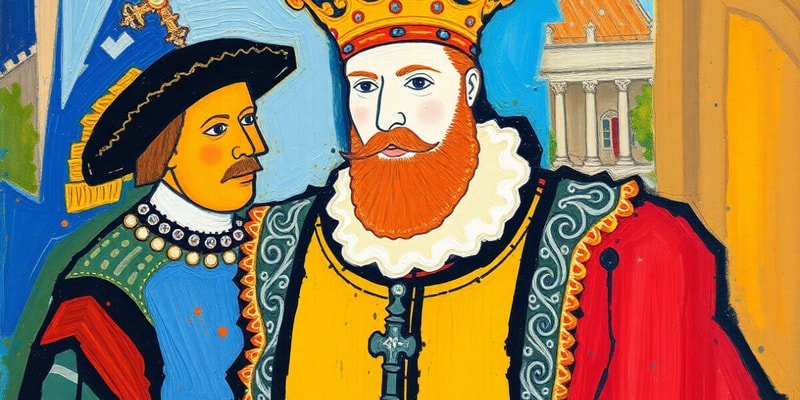Podcast
Questions and Answers
What does the term Revival of Learning primarily signify?
What does the term Revival of Learning primarily signify?
Roger Ascham criticized which aspect of English literature during the Revival period?
Roger Ascham criticized which aspect of English literature during the Revival period?
What is the main theme of Erasmus's 'Praise of Folly'?
What is the main theme of Erasmus's 'Praise of Folly'?
In which year was More's 'Utopia' published?
In which year was More's 'Utopia' published?
Signup and view all the answers
What significant contribution did Tyndale make to the New Testament?
What significant contribution did Tyndale make to the New Testament?
Signup and view all the answers
What literary form did Sir Thomas Wyatt and Henry Howard, Earl of Surrey, introduce to English literature?
What literary form did Sir Thomas Wyatt and Henry Howard, Earl of Surrey, introduce to English literature?
Signup and view all the answers
What was notable about Malory’s 'Morte d'Arthur'?
What was notable about Malory’s 'Morte d'Arthur'?
Signup and view all the answers
What was a primary focus of literature during the Revival period?
What was a primary focus of literature during the Revival period?
Signup and view all the answers
Why was Tyndale's translation significant?
Why was Tyndale's translation significant?
Signup and view all the answers
Who was the protagonist in More's 'Utopia' who provides insights into societal issues?
Who was the protagonist in More's 'Utopia' who provides insights into societal issues?
Signup and view all the answers
What were Henry V's aspirations during his reign?
What were Henry V's aspirations during his reign?
Signup and view all the answers
What was the significance of the Treaty of Troyes?
What was the significance of the Treaty of Troyes?
Signup and view all the answers
What impact did Joan of Arc have on the English foreign possessions?
What impact did Joan of Arc have on the English foreign possessions?
Signup and view all the answers
Which event marked the end of civil wars in England?
Which event marked the end of civil wars in England?
Signup and view all the answers
What major change occurred during Henry VIII's reign?
What major change occurred during Henry VIII's reign?
Signup and view all the answers
What was the significance of Caxton’s printing in 1486?
What was the significance of Caxton’s printing in 1486?
Signup and view all the answers
What does the term 'Renaissance' most accurately refer to?
What does the term 'Renaissance' most accurately refer to?
Signup and view all the answers
What was the outcome of Cade’s Rebellion in 1450?
What was the outcome of Cade’s Rebellion in 1450?
Signup and view all the answers
How did the English Renaissance influence education?
How did the English Renaissance influence education?
Signup and view all the answers
What was the broader impact of the Reformation in England during Henry VIII's reign?
What was the broader impact of the Reformation in England during Henry VIII's reign?
Signup and view all the answers
Study Notes
English History (1400-1550)
- The period between 1400 and 1550 saw significant changes in England.
- Henry V led England in a quest for French land, culminating in the Battle of Agincourt in 1415 and the Treaty of Troyes in 1420.
- Henry VI, Henry V's son, was a weak king, leading to instability and rebellion.
- Joan of Arc helped France reclaim its lost territories, while England experienced internal strife with Cade's Rebellion (1450) and the Wars of the Roses (1455-1485).
- Richard III's reign marked the end of the Wars of the Roses, paving the way for the Tudors and a renewed sense of English nationalism.
Henry VIII
- Henry VIII's reign saw significant growth in England's power, both domestically and internationally.
- He ushered in the Reformation in England, leading to the separation of the Church of England from Rome with the Act of Supremacy.
The Renaissance
- The Renaissance marked a period of intellectual and artistic rebirth after the medieval period.
- Caxton introduced printing to England in 1476, allowing for the wider dissemination of ideas.
- The Renaissance saw the establishment of schools and universities, the introduction of Greek ideas, and the promotion of individual freedom through the Reformation.
- The Revival of Learning refers to the rediscovery and imitation of classical models in art and literature.
Literature of the Revival (1400-1550)
- This period saw a resurgence of artistic and intellectual expression, but not necessarily a golden age of literature.
- Roger Ascham expressed dissatisfaction with the quality of English literature compared to Latin and Greek.
- This period saw the groundwork for a new literature, with the exploration of Greek and Roman ideas.
Key Works and Authors
- Erasmus's Praise of Folly (1511): A satire critiquing the vices of kings, clergy, and education, celebrating the "New Learning."
- More's Utopia (1516): An exploration of social conditions, featuring a utopian society based on liberty, fraternity, and equality.
- Tyndale's New Testament (1525): A translation from the original Greek, significantly influencing the common people and shaping the English Bible.
- Wyatt and Surrey (1557): Introduced the sonnet and blank verse through their poetry and translations, laying the groundwork for future literary giants.
- Malory's Morte d'Arthur: A collection of Arthurian romances, influential in shaping future literature.
Studying That Suits You
Use AI to generate personalized quizzes and flashcards to suit your learning preferences.
Description
Explore the pivotal events of English history from 1400 to 1550, including the reigns of Henry V and Henry VIII, the Wars of the Roses, and the impact of the Renaissance. This quiz covers key battles, political instability, and cultural shifts that shaped modern England. Test your knowledge on significant historical figures and their contributions to English nationalism.




